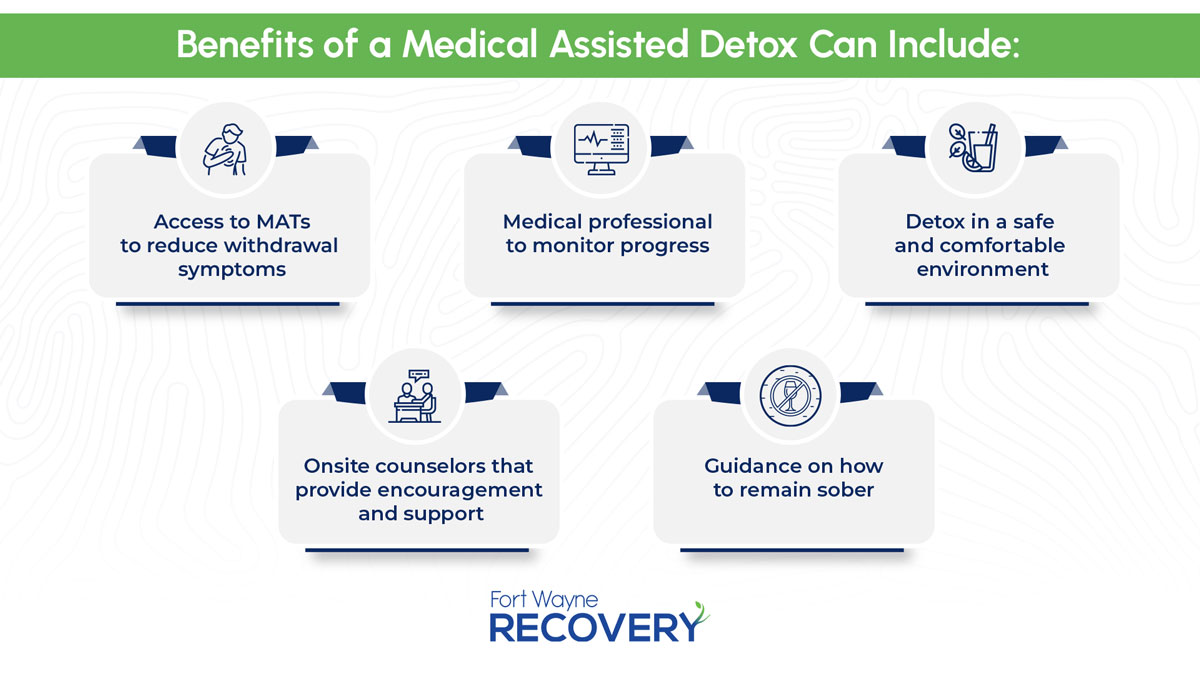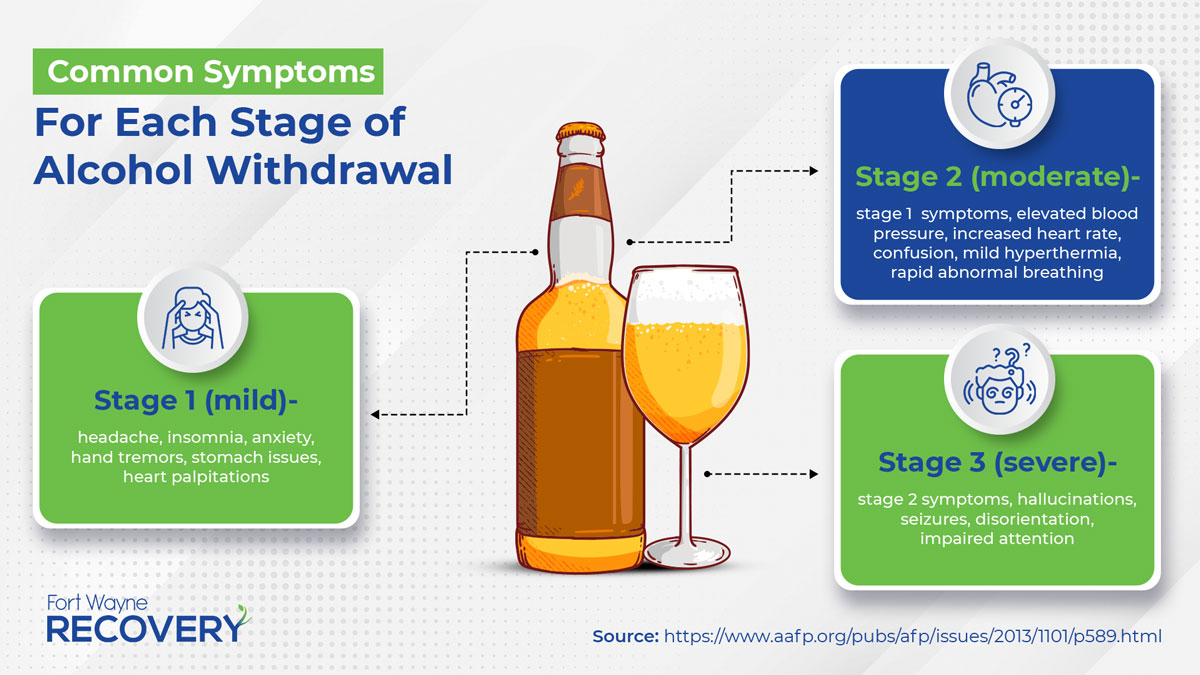Why Medical Detox is the Best Way to Detox from Drugs and Alcohol
Why Medical Detox is the Best Way to Detox from Drugs and Alcohol
The U.S. Department of Health and Human Services (HHS) Substance Abuse and Mental Health Services Administration (SAMSA) most recent annual survey reported that 46.3 million people aged 12 or older met the criteria for a substance use disorder in 2021. Of those 29.5 million people were classified as having an alcohol use disorder and 24 million people were classified as having a drug use disorder.
Unfortunately for those who want to achieve sobriety, it can be a long road to recovery especially when they try to detox on their own which often leads to relapse due to the severity of the withdrawal symptoms they experience. However, those who decide to complete a medical detox, have a much better chance of maintaining long-term sobriety due to the support they receive during the detox process.

Why Alcohol Withdrawal Can Be Dangerous
Why Alcohol Withdrawal Can Be Dangerous
Even though consuming alcohol is legal in contrast to drugs like heroin or methamphetamines, it can still be dangerous to detox from. This is certainly the case if someone has been consuming large amounts of alcohol for several years and has built up a tolerance to it.
Most people with a severe alcohol addiction will detox over 72 hours and could experience the following side effects after consuming their final drink:
- 6 to 12 hours – early withdrawal symptoms begin including headache, anxiety, insomnia, small tremors, nausea and gastrointestinal issues.
- 12 to 24 hours – visual or auditory hallucinations can occur.
- 24 to 72 hours – seizure risk is highest from 24 to 48 hours after drinking. Withdrawal delirium tremors (DTs) may appear from 48 to 72 hours after drinking. While uncommon the DTs have a mortality rate of 1% to 4%.
While not everyone experiences severe alcohol withdrawal symptoms, certain factors can make someone more likely to develop them including:
- Heavy daily alcohol use
- Being older
- A history of DT’s
- Certain illnesses
- Being dehydrated
- Electrolyte disturbances
- Brain lesions
- Liver issues

Tommy Streeter, a community outreach coordinator for Allendale Treatment and Fort Wayne Recovery says that when people detox from alcohol and benzodiazepines like Xanax, it can quickly turn into a life-threatening situation. “Alcohol and benzodiazepines like Valium and Xanax are the most dangerous substances to detox from,” says Streeter. “People can have seizures or their blood pressure can get dangerously high.”
“People can have seizures or their blood pressure can get dangerously high.”
“People can have seizures or their blood pressure can get dangerously high.”
Opioid Withdrawal Can Take Months to Years to Complete
Over 60 million people are addicted to opioids worldwide and opioid withdrawal can be a difficult, drawn-out process depending on the opioids someone is detoxing from. Methadone, for example, takes longer to exit the body than other opioids. Other factors that could determine the length of time it takes someone to detox from opioids include – if they took multiple drugs, the person’s overall health and their tolerance to the drug(s).
While the timeline for opioid withdrawal can vary, it generally consists of the following:
- 3 to 4 hours after the last dose – symptoms include heightened anxiety as well as strong opioid cravings that could cause drug-seeking behavior.
- 8 to 10 hours after the last dose – symptoms include nausea, vomiting, sweating and stomach aches. Increased restlessness and anxiety can occur as well as drug-seeking behavior.
- 1 to 3 days after the last dose – symptoms include body tremors, muscle spasms, diarrhea, insomnia and increased blood pressure. Cravings peak during this stage and the person could be bedridden due to the severity of their symptoms.
- Up to 24 months after the last dose – symptoms include mood swings, cravings, vivid dreams, anxiety, depression, agitation, insomnia and trouble concentrating. People are also more prone to relapsing during this period especially if they encounter any triggers.
Nate Moellering is also a community outreach coordinator at Allendale Treatment and Fort Wayne Recovery and recovering opioid addict says that detoxing from opioids left him feeling so bad that it took multiple attempts before he was successful with his recovery. “When you take drugs like opiates you experience euphoria but when you detox from opiates you experience dysphoria which is a sense of impending doom along with several different physical side effects,” says Moellering. “It’s a miserable experience.”
It’s a miserable experience.”
Nate Moellering, Community Outreach Coordinator
Why Medical Detox?
The severity and length of time to detox off of drugs or alcohol is very unpredictable and that’s why addiction experts like Streeter and Moellering recommend that people go to a detox facility or the hospital. “I always encourage people to go to an in-person detox center like Allendale Treatment for at least a few days,” says Moellering. “Whether your detoxing from alcohol or heroin it needs to be done in a medical setting where people have experience with the detox process because I know people who have died from a grand mal seizure while they were detoxing on their own.”
Some facilities have medically trained staff who can closely monitor the detox process and make any needed changes to ensure the patient’s safety and comfort. In addition to supervision and support, some of the additional benefits that come with a medical detox include access to medications (MATs) that can minimize withdrawal symptoms and make for an easier detox process. Some of the medications that can be used to reduce opioid withdrawal symptoms include:
- Methadone
- Buprenorphine
- Clonidine
- Over-the-counter medications such as Tylenol or Imodium
“I always encourage people to go to an in-person detox center”
Dr. Carl, a Pediatric Pulmonologist
Some facilities also provide onsite counseling and therapy to help start addressing any mental health issues that are driving the addiction such as unresolved trauma, depression, or social anxiety. And while the detox process can be unpleasant, the setting doesn’t have to be which is why some detox facilities offer luxury accommodations including massage chairs, catered meals and ping pong tables to help pass the time.
Medical detox is often considered the first stage of addiction treatment and once the detox process has been completed the patient may decide to enter a rehabilitation center to continue to work on their sobriety. Many detox centers can provide guidance and information regarding additional treatment they can receive including in-patient rehab, sober living, or support groups such as AA or NA.

